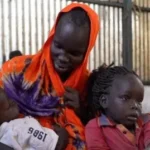Pope John Paul II, the first pope from outside Europe in over a millennium, is dearly remembered in Africa for his unwavering support for the continent’s development, unity, and peace. His distinguished visits and advocacy not only shaped the Catholic Church’s engagement with Africa but also offered a platform for voicing the continent’s aspirations and challenges. Today, as various nations commemorate his legacy, it’s crucial to reflect on how his words and actions continue to resonate in African society.
A Champion of Social Justice
Pope John Paul II’s visits to Africa between 1980 and 1998 marked historic moments in the relationship between the Catholic Church and the continent. His 1995 trip to Uganda, on the 20th anniversary of the martyrdom of St. Charles Lwanga and his companions, highlighted his commitment to social justice and human rights. In his speeches, he often emphasized the dignity of every human being, calling for the end of poverty, conflict, and corruption. This message is as pertinent today as it was during his papacy, with many African leaders and organizations invoking his teachings in their advocacy for social justice.
Promoting Peace in a Turbulent Era
During the 1990s, Africa faced a series of devastating conflicts, from the Rwandan Genocide to civil wars in Sierra Leone and Angola. Pope John Paul II was vocal about the need for peace, often visiting nations affected by war. He emphasized forgiveness and reconciliation, urging combatants to lay down their arms and work towards a harmonious coexistence. His presence in Africa was not merely ceremonial; rather, it reflected a deep commitment to peace-building efforts, encouraging communities to heal and rebuild.
In 1997, during his visit to the Central African Republic, he said, “Peace is a gift from God to be welcomed and cherished,” a sentiment that continues to inspire peace efforts on the continent. Today, many African faith leaders recall his teachings as they work toward resolving conflicts and fostering dialogue among communities.
A Voice for the Marginalized
Pope John Paul II’s advocacy extended beyond just church-related issues; he addressed global economic injustices that disproportionately affect African nations. He spoke against the exploitation of natural resources, urging the international community to recognize the rights and needs of marginalized populations. His consistent call for debt relief for poor countries resonates today in ongoing discussions about economic equity in the global arena.
Organizations like the African Union and numerous NGOs have drawn upon his teachings to advocate for sustainable development objectives, fair trade practices, and political accountability. His vision of a more just world continues to galvanize movements aimed at lifting Africans out of poverty.
A Lasting Influence on African Catholicism
John Paul II’s visit paved the way for a growing African Catholic establishment, reinforcing the church’s position as a critical player in societal issues. His legacy is not just in his words but also in the thriving church he left behind, which plays an active role in health care, education, and social justice throughout Africa. The papal emphasis on community engagement has led to a flourishing Catholic presence that serves as a beacon of hope for millions.
Additionally, the appointment of African cardinals and bishops during his tenure heralded a new era of leadership within the Church, fostering a generation of clergy who continue to influence Catholicism across the continent. His successors, particularly Pope Francis, have also focused on addressing African issues, thereby keeping John Paul II’s spirit alive.
Conclusion
As Africa remembers Pope John Paul II, his legacy remains a powerful testament to the potential for dialogue, reconciliation, and hope. His teachings continue to inspire not only Catholics but a broader audience in the pursuit of justice, peace, and development throughout the continent. For many, he is more than a religious figure; he was a champion for Africa, echoing its struggles and triumphs in the global arena. His message of empathy and solidarity resounds profoundly, reminding us that the journey toward a just Africa must continue.
Email Us on editorial@nnafrica.com













